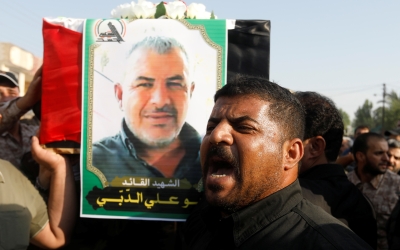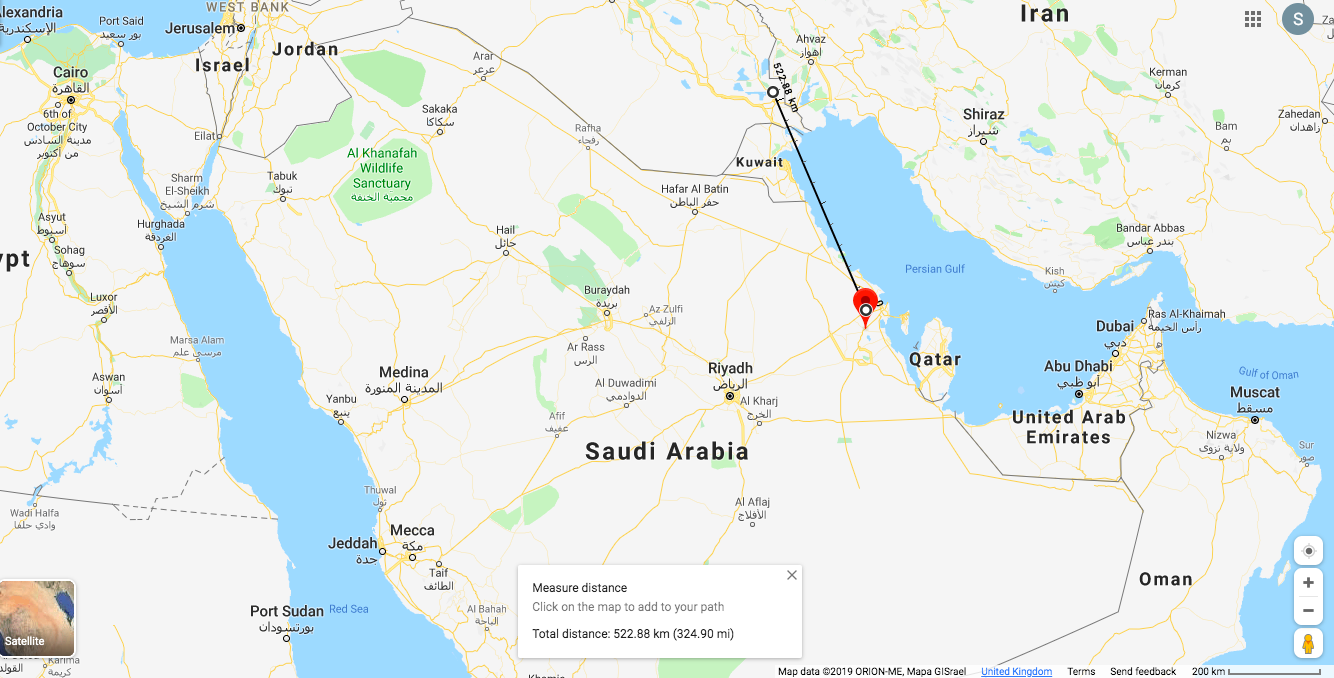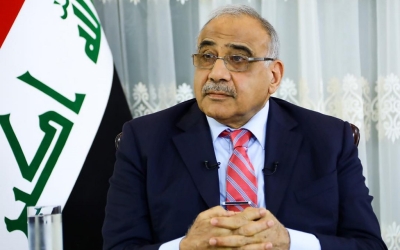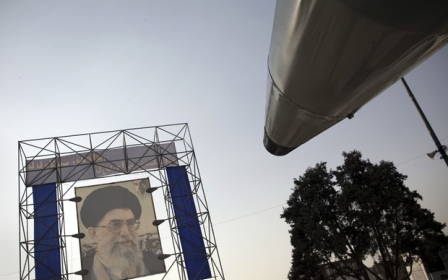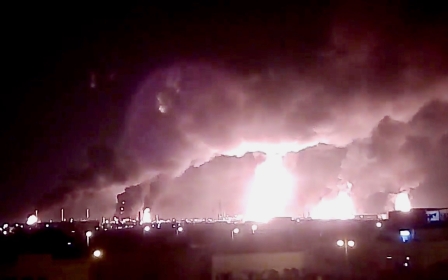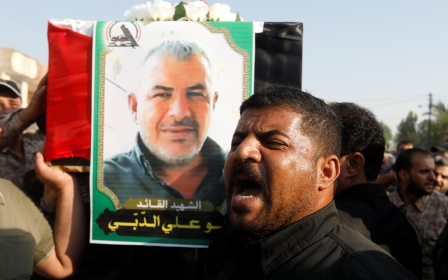EXCLUSIVE: Iranian drones launched from Iraq carried out attacks on Saudi oil plants
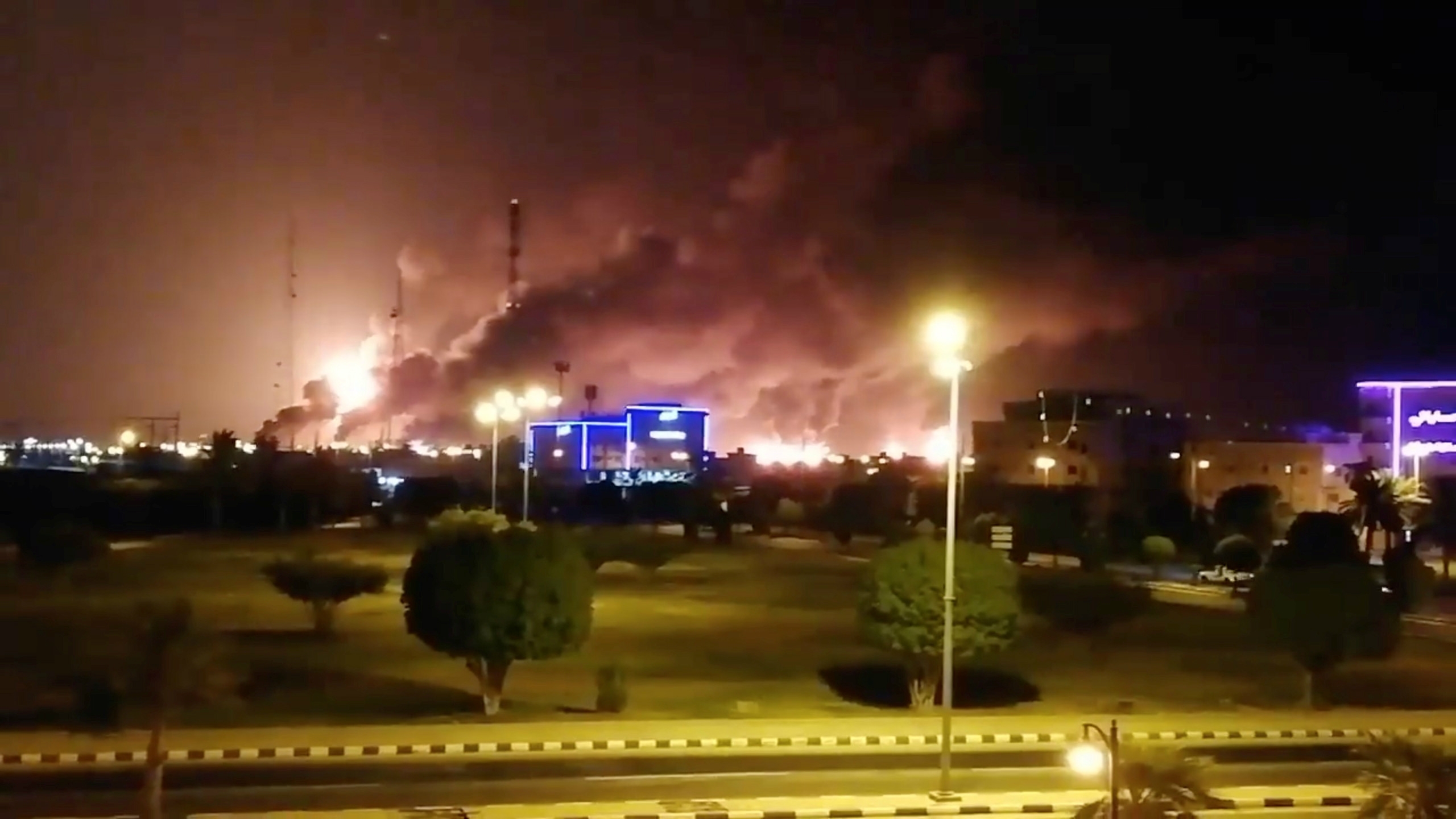
The strikes which paralysed the Saudi oil industry on Saturday morning, forcing it to halve its output of crude oil, were made by Iranian drones launched from Hashd al-Shaabi bases in southern Iraq, a senior Iraqi intelligence official has told Middle East Eye.
The attacks on Abqaiq and Khurais, two key Aramco facilities in eastern Saudi Arabia, were in retaliation for Israeli drone strikes on Hashd al-Shaabi bases and convoys in August, which were co-ordinated and funded by the Saudis, the official said.
“The latest attack comes for two reasons: another message from Iran to USA and its allies that as long as its siege on Iran continues no one will have stability in the region. However, the second more direct reason is a strong Iranian revenge for the recent Israeli attacks by drones launched from SDF-controlled areas in Syria against pro-Iranian Hashd bases,” he said.
“These Israeli drone attacks were supported and financed by the Saudis. That is why the recent attack was the most devastating, while the previous attacks were more symbolic and inflicted little harm," the official said.
In August, five drone attacks on the Iranian-trained Hashd militia were launched from Kurdish bases under the control of Syrian Democratic Forces (SDF) areas of northeastern Syria, MEE reported at the time.
The drones struck bases, weapons depots and a convoy belonging to Hashd al-Shaabi, killing one fighter and severely wounding another.
Iraqi intelligence said the strikes were planned when Saudi Minister of State for Gulf Affairs, Thamer al-Sabhan, visited the SDF in Syria in June.
Drone seen over Kuwait palace
The Iraqi intelligence official refused to say which bases Saturday’s drones were launched from.
However, he confirmed that the distance between southern Iraq and the Saudi oilfields was about half the distance the drones would have had to fly had they been launched from Houthi bases in northern Yemen.
He said the drones had to travel between 500km and 600km, where as if they had been fired from Houthi bases they would have had to cover a distance of between 1,100km and 1,300km.
The flight path of the drones travelling south from Iraq to the eastern oilfields of Saudi Arabia would have taken them over the sea or through Kuwait’s airspace.
Kuwait media reported on Saturday that a three-metre drone was sighted flying above the Dar Salwa palace in the centre of Kuwait City.
Alrai newspaper said that a three-metre-long unmanned aircraft, which came from the sea, descended to an altitude of 250 metres above the palace.
The drone hovered near the beach of Al Badaa and headed to the city of Kuwait.
MEE was unable to confirm whether this was connected to the attack on the Saudi oil installations.
Kuwait's government said on Sunday that it was investigating the drone sighting.
"The security leadership has started the necessary investigations over the sighting of a drone over the coastline of Kuwait City and what measures were taken to confront it," the cabinet said on its Twitter account.
It said Prime Minister Sheikh Jaber al-Mubarak al-Sabah directed military and security officers to tighten security at vital installations in the Gulf OPEC producer and to take all necessary measures "to protect Kuwait's security".
Iraqi denial
The Houthis have claimed responsibility for Saturday’s attack, however the official said: “It was not the Houthis. These were Iranian drones launched from Hashd al-Shaabi bases.”
The embattled Iraqi government was forced on Saturday to issue a statement denying the drone attacks on Saudi facilities came from its territory.
'Tehran is behind nearly 100 attacks on Saudi Arabia while Rouhani and Zarif pretend to engage in diplomacy'
- US Secretary of State Mike Pompeo
The statement issued by the prime minister’s press office read: “Iraq denies what has been reported by the news media and the social media about the use of its territories to launch an attack on Saudi oil installations using drones.
"It asserts its constitutional commitment to preventing the use of its territories for aggression against its neighbours, brothers and friends.
“The Iraqi government will deal firmly and decisively with whoever attempts to violate the constitution.
"A committee composed of relevant Iraqi parties has been formed in order to pursue information and follow up developments.”
'Between the rock and a hard place'
For months, Iraq Prime Minister Adel Abdul Mahdi has been desperately attempting to prevent his country from being used as a battleground in a proxy war between the US and Iran.
Earlier this year, the US military signalled its intention to him to strike an airfield held by Iraqi Hezbollah after drone strikes on oil facilities in the Gulf.
Abdul Mahdi was reported by witnesses to the exchange to have told the Americans that he could not stop them striking wherever they wanted, but neither could he prevent retaliatory strikes by Iranian backed militias on US troops and bases in Iraq.
The US strike on Iraqi Hezbollah never took place. Instead, the US allowed Israel to use its drones from SDF bases in northeastern Syria.
In August, Abdul Mahdi came under huge pressure to publicly accuse Israel of launching drones to attack targets on Iraqi terrritory.
“Our prime minister Adel Abdul Mahdi is between the rock and a hard place,” the Iraqi intelligence source told MEE.
“He told both the Iranians and the Americans Iraq is exhausted after decades of wars, conflicts and civil war.
"Dragging it into the centre of the proxy war between Iran on one side and the USA and its regional allies on the other will risk irreparable damage to its stability and unity with huge implications for the whole region."
However, the prime minister’s pleas have been in vain. “Neither side is listening,” the official said.
'Pretend diplomacy'
On Saturday, US Secretary of State Mike Pompeo accused Iran of leading the attacks on Saudi Arabia and denounced Tehran for engaging in false diplomacy.
"Tehran is behind nearly 100 attacks on Saudi Arabia while Rouhani and Zarif pretend to engage in diplomacy," Pompeo said in a Twitter post, referring to Iran's President Hassan Rouhani and Foreign Minister Mohammed Javad Zarif.
"Amid all the calls for de-escalation, Iran has now launched an unprecedented attack on the world's energy supply," Pompeo tweeted, offering no evidence of the origin of the attacks, according to the Reuters news agency.
Iran earlier condemned as "unacceptable" US accusations it was behind the attacks on the Saudi oil plants.
This article is available in French on Middle East Eye French edition.
Middle East Eye propose une couverture et une analyse indépendantes et incomparables du Moyen-Orient, de l’Afrique du Nord et d’autres régions du monde. Pour en savoir plus sur la reprise de ce contenu et les frais qui s’appliquent, veuillez remplir ce formulaire [en anglais]. Pour en savoir plus sur MEE, cliquez ici [en anglais].


